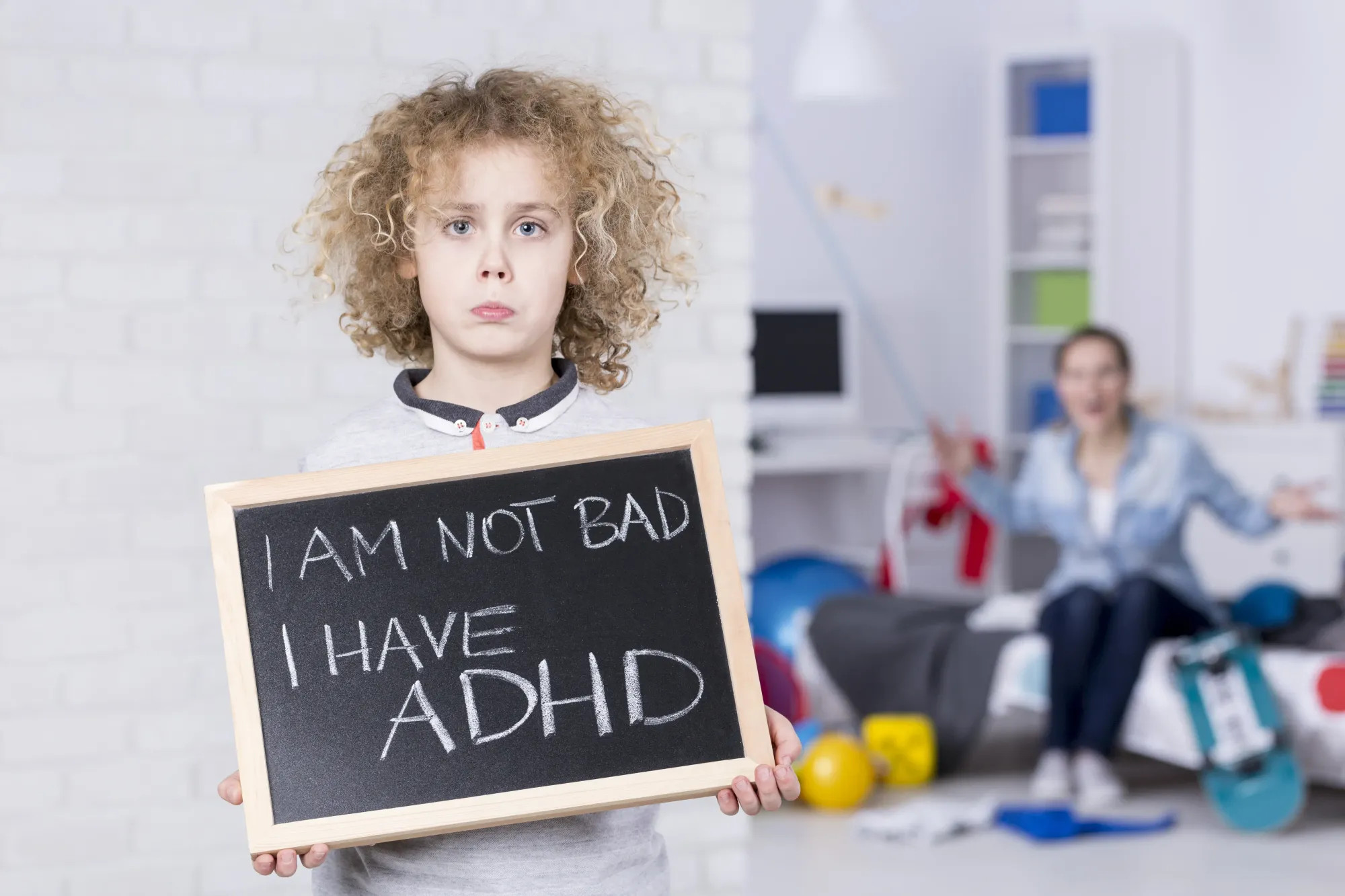ADHD (Attention Deficit Hyperactivity Disorder, commonly known as ADHD) is a neurodevelopmental disorder that is very common in children. It usually begins before the age of seven. Patients are always unable to control instinctive behaviors due to delayed brain development. Therefore, your child may “not learn well”, but may be troubled by ADHD “not learn well”.
You May Misunderstand ADHD
Maybe you’ve heard of the concept of ADHD before, but haven’t learned much about its symptoms, dangers, and treatments. The mix of true and false information, coupled with sometimes subjective assumptions, gives us some wrong views on ADHD, which can interfere with our judgment and even delay the treatment of our children.
Here are some common misconceptions about ADHD and their corresponding truths.
Myth 1: All children with ADHD are active
- Being active is only a symptom of some children with ADHD. Some children only have attention deficits and are not lively and active, but they are also ADHD patients.
Myth 2: Children with ADHD are completely unable to concentrate
- In fact, children with ADHD can stay focused on topics and activities that interest them, but if the tasks are mechanical, repetitive, and boring, they will not be able to concentrate no matter how hard they try.
Myth 3: Children with ADHD will do better if they are willing to change
- Children with ADHD may want to make changes and try their best, but still cannot do something that seems simple to others, such as sitting quietly and concentrating on listening. Maybe they look disobedient, but they don’t do it on purpose.
Myth 4: ADHD gets better when you grow up
- In fact, ADHD often persists into adulthood, so it should be detected and treated early rather than delayed until the child becomes an adult.
Myth 5: Medication is the best choice for ADHD treatment
- There are drug treatments for ADHD, but single-drug treatment may not be the most suitable for your child. Comprehensive treatment methods also include behavioral intervention, psychological counseling, etc. The effect of combined treatment is often better than a single intervention method.
3 Major Symptoms and Manifestations of ADHD
It is normal for children to be very curious and like to explore the world, so it is difficult to completely distinguish between ADHD and normal child behavior.
If your child only occasionally shows some similar symptoms, it may not be ADHD, and you don’t need to easily follow the rules and create anxiety for yourself.
But if your child exhibits a variety of typical ADHD symptoms and these symptoms persist whether at home or school, alone or with friends, then parents should be particularly concerned.
Some children with ADHD are lively and active, while others are very quiet but have difficulty concentrating.
Although they look very different, they are all ADHD patients and the characteristics of the child depend on which symptom is dominant.
Inattention, hyperactivity, and impulsivity are the three main symptoms of ADHD, and patients may have one, two, or all three.
The following are their main manifestations. Parents can compare and self-examine their children’s behavior.
Lack of concentration
- Children with ADHD have no difficulty concentrating on things they enjoy, but if the task is boring, their attention may be quickly distracted.
- Another problem is that they usually fail to follow the regular process, jumping to the next task before completing the previous task, or always ignoring key steps.
- Therefore, it is very difficult for children with ADHD to complete tasks such as homework within the specified time.
- Children with ADHD will be attracted to distractions and put down what they should be doing if there is any disturbance around them, so they need a quiet, undisturbed environment to stay focused.
- If a child only has the symptom of inattention, parents usually do not pay attention to it, because this symptom is not very destructive, but it can also cause trouble and obstacles to the child’s learning and life.
Hyperactivity
- Hyperactivity is the most common and obvious manifestation of ADHD in children. Although it is normal for most children to be active and active in childhood, what is different about ADHD children is that they are active all the time.
- They may do several things well at the same time but make a mess of them all, jumping down where they can climb down.
- If you ask them to sit still, it may be very difficult for just a few minutes. Although the person is still on the stool, they keep shaking their legs, kicking the floor, or tapping their fingers.
Impulsive
- Children with ADHD have very weak self-control abilities because they always do things impulsively and rarely consider whether something should be done or what the consequences will be.
- They may interrupt suddenly, interfere with privacy, intrude into other people’s personal space, and disrupt class order.
- It is difficult for them to follow instructions such as “Be patient” and “Wait a while”. They are often moody and always overreact, causing various interpersonal problems.
If your child does have the above symptoms, don’t rush to conclusions, because certain major events and mental and physical health problems can also cause similar symptoms.
Before ADHD is diagnosed, you can consult a child psychiatrist to rule out these possibilities and obtain more accurate results:
- Learning disabilities: problems with reading, writing, etc.
- Psychological disorders: anxiety, depression, bipolar disorder, etc.
- Behavioral disorders: behavioral disorders, reactive attachment disorder, oppositional defiant disorder, etc.
- Physiological diseases: thyroid problems, neurological diseases, epilepsy, etc.
- Major events or traumatic experiences: moving, parents’ divorce, death of a relative, school bullying, etc.
Children with ADHD Are Also “Potential Stocks”
Just because a child has ADHD does not mean that he or she is not smart or less capable than other children. ADHD has nothing to do with intelligence or talent. Moreover, children with ADHD will also show some positive traits. Parents should see the advantages of their children and discover and protect each child’s unique personality and energy.
They are creative
- Children with ADHD can be very creative, often with wild imaginations and colorful inner lives.
- Their “daydreams” may become a source of inspiration for artistic creation, and “multitaskers” may discover unique ways to solve difficult problems.
- Children with ADHD are easily distracted, but because of this, they also notice the beauty in life that others miss.
Their thinking is flexible and open
- Since children with ADHD consider multiple possible ways at once rather than following conventional thinking, on the other hand, they have fewer limitations in their thinking can think outside the box, and are more tolerant of new things.
They are enthusiastic and proactive
- Most children with ADHD have lively personalities and a wide range of interests. They have endless things to say and rarely fall silent when chatting.
- They also show a high degree of initiative in tasks. In short, there may be twists and turns in the process of getting along, but they can also find interesting aspects.
They have plenty of energy
- When faced with something they are motivated to do, children with ADHD will go all out and defy the odds. They rarely say they are tired or don’t have the energy to continue.
- In this case, it is difficult to distract them with other things, especially tasks that are highly interactive or require manual skills.
Educational Methods for Children with ADHD
Children with ADHD may have academic and social difficulties and often get into trouble, which can be frustrating and stressful for parents.
But parents are the ones most likely to help their children, and children need their parents’ companionship and support the most. If they receive effective help, children can control ADHD symptoms and overcome various daily challenges.
Medication is not the only option when it comes to ADHD treatment, nor is it usually the first choice for pediatric patients.
Other effective methods include behavioral therapy, psychological counseling, etc. You can work with the child’s teacher and doctor to develop a personalized treatment plan that meets the child’s needs.
Good parenting can also go a long way in alleviating ADHD symptoms. Remember that children not only need clear plans and rules to guide correct behavior, but also lots of love, support, and encouragement.
Here are some parenting tips to help our ADHD children:
- Give clear expectations: Don’t be ambiguous with your children. Determining the time and content will make the task easier and make it easier for the children to receive the information. Clearly tell what not to do, and set a reward and punishment system with your child.
- Establish a fixed schedule: Simplify your daily schedule, add things that are good for your health, and form daily habits. Stick to it and small changes will add up.
- Increase exercise and sleep appropriately: Encourage them to participate in sports, develop the habit of exercising, consume excess energy, and ensure adequate and high-quality sleep.
- Healthy diet: Eating three nutritious and balanced meals a day is not only good for your health and allows your child to thrive, but it can also help relieve various symptoms of discomfort.
- Guide communication: teach children how to make friends and let them understand the importance of listening. At the same time, tell children the corresponding meanings of various facial expressions and body language, and how to deal with disputes.
- Take care of yourself: Parents should not be busy taking care of their children but neglect their health. When you feel stressed, you should talk to the people around you, ask for help, or seek professional help promptly.
Conclusion
Parents should not be too impatient when their children’s performance is not ideal. Before blaming our “troublesome kids,” consider that they are also facing troubles and may want to change but are unable to do anything about it. Understanding children’s difficulties will make them feel respected and supported by their parents, and communication will be smoother.
A child with ADHD may be a special sapling. Although it grows a little slowly and needs more patient irrigation and care from its parents, it may be because of waiting that it will bring more surprises when the tree is cut.



